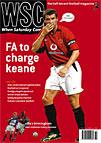 Football Focus presenter Ray Stubbs explains to Andy Lyons how the BBC's flagship has coped with the loss of highlights rights, and how it dealt with the ITV Digital story
Football Focus presenter Ray Stubbs explains to Andy Lyons how the BBC's flagship has coped with the loss of highlights rights, and how it dealt with the ITV Digital story
Some might say Football Focus has become more fan-oriented over time, but the programme is always evolving and you don’t particularly notice which way it’s going unless you sit back and look at the tapes of it season by season. Sometimes the BBC might set the agenda, ITV comes up with a response, then Sky, then that in turn might trigger a response from us. We all take the lead at different times. I’m not someone who will just say “the BBC leads the way”, but at the same time I am proud of what we do. I think our public service broadcast remit does enable us to go a little bit deeper in our coverage than some other broadcasters might feel they are able to.
The fact that rights to the Premiership and the Champions League are now held by other networks doesn’t have an effect on the way they are covered on the BBC, outside of not being able to show the goals. We always try to go beyond the story and provide viewers with an overall picture. We don’t get equal access, but we’ve still got excellent relationships with the clubs and most of them are more than happy to work with us even though, because of rights issues and contracts, they’re not able to give us exactly what we want.
As regards the Premiership being seen as someone else’s product, Adam Crozier chose to talk to us last month about the Roy Keane incident, which demonstrates that the lack of live Premiership rights doesn’t affect Focus being seen as an important programme. Our viewing figures remain good. I would hope that people are watching us because we are a programme that is part of the tapestry of football. We’d hope that rights issues would never get in the way of that.
The reverse is true with the FA Cup, where we’re able to present detailed coverage from the first round onwards. I see it written that some people within football don’t take the FA Cup seriously now, but if you get a tape of last season’s final and look at the Arsenal players when they’d won it, you can see how important it was to them. The only match that was down, audience wise, last season, was the final and there were a lot of factors: hot day, two London clubs, a magnificent snooker final on.
I couldn’t comment on how other elements of the BBC covered the collapse of ITV Digital but, from a Football Focus point of view, it was not a difficult story to cover. I think we put ourselves in the position of football fans – in the studio you’ve got a big Preston fan, Mark Lawrenson, and a Tranmere Rovers fan, myself, both supporting teams who were directly involved. I would take issue with anyone who said we just kicked our competitors. In fact, we particularly made sure that we didn’t.
TV will certainly pay less for football from now on – it’s already been seen to be prepared to pay less – and that is going to force everyone to look at how they run themselves. And if there are going to be major upheavals in English football in the near future, television would be absolutely tied up with the direction it will go. I think that if you’re partly funding something you’re going to want a say. There could be negative effects from that, but that doesn’t mean there will be. There’s a balancing act – it’s a joint venture between football, the authorities and the TV companies.
In terms of specific changes that might come in, I would be saddened to see regionalisation of the lower divisions, though I can understand the arguments behind it. I think a healthier First Division is vital, by which I mean that the clubs falling out of the Premiership need a much plumper cushion. This is purely to get us out of the mess we’re in now. People keep talking about Premier League II but there just doesn’t seem to be any appetite there for that.
Viewing figures for some live football would suggest there’s too much, but when it’s a big important game there is a visible demand for it. Pay-per-view looks to me like a experiment that didn’t work. I don’t know the exact figures but I don’t hear people saying they’re phoning up all the time with their credit cards. Rangers and Celtic joining the English league, though, is clearly a way forward. As high as the barriers are put up to prevent it, some people keep chipping away. And if you look at how football has changed since the start of the Nineties, who can guess at where it will be in ten years’ time?
From WSC 188 October 2002. What was happening this month